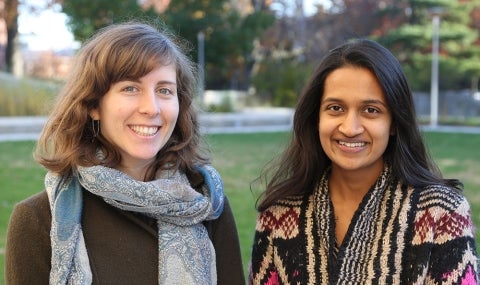Two students from the Yale School of Forestry & Environmental Studies (F&ES) have been awarded the 2016 MK McCarthy-RW Worth Scholarship for Leadership in Conservation Science.
Pooja Choksi ’17 M.E.M., who is focused on community-based wildlife conservation, and
Samantha Garvin ’17 M.E.Sc., who is studying stakeholder perspectives on human-elephant interactions in Africa, were recognized for their demonstrated leadership in the field of conservation biology and wildlife science.
The recognition honors their work both at F&ES and in their prior work experiences.
Before coming to Yale, Choksi worked as a program manager at the Pench Tiger Reserve in central India. While she oversaw environmental education and the reserve’s sensitization program, she also developed and taught a three-year curriculum in the local government schools. She later raised money to expand the environmental sensitization program to include a reading program and mobile libraries to address gaps in the education system.
At F&ES she is taking courses to develop skills to better practice wildlife conservation and conflict mitigation. In her coursework she has concentrated on conservation science, social science for conservation and development, and courses on geospatial analysis.
“The vision I have for wildlife conservation is one that is tied closely to sustainable development,” she said. “Adopting a landscape level approach to conservation would serve not only the ecosystem but also the people that live in these ecosystems.”
Samantha Garvin entered the conservation field as an undergraduate at Barnard College, where she worked on salmon conservation in Puget Sound and wildlife rehabilitation on Vancouver Island, and conducted an urban ecology research project in New York City. In addition, she spent a semester studying wildlife management in Kenya and Tanzania, which gave her an opportunity to view wildlife ecology and management in the context of development. After college she explored the impacts of climate change on development and food security.
Her coursework at F&ES reflects this intersection of conservation and international development, with an emphasis on the study of human aspects of conservation alongside natural science. Her goal is to approach conservation challenges holistically, considering the natural and human-made elements of these problems.
“The focus of my research looks at how various participants orient to the problems of human-elephant interactions in Northern Botswana where elephants and humans interact regularly, sometimes with deadly outcomes,” she said. “I pair assessments of the natural problems, by looking at the shifting elephant ranges with the perceptions of how wildlife is managed.”
The scholarship, which provides $2,500 to each recipient, was established last year by
Margaret McCarthy ’82 B.A., and her husband
Robert Worth, to benefit master’s students who have completed a minimum of two semesters and have demonstrated leadership in the field of conservation biology and wildlife conservation.
Recipients of the conservation scholarship are selected based on their demonstrated leadership at F&ES and their dedication to advancing the field of conservation biology. For the judges, leadership can be demonstrated in many ways, including organizing events or speakers, promoting professional skills development, conducting excellent research, or mentoring classmates through teaching fellowships and other positions.
The aim of this scholarship is to foster and promote professional development and the advancement of conservation science at F&ES.
“Bob and I have been lucky to meet amazing people working in the field of conservation — all of whom are preserving our natural world for future generations,” said McCarthy. “We are delighted to support these remarkable F&ES students following that path.”
Students interested in applying next year should contact Tim Northrop in the F&ES Development and Alumni Services Office at tim.northrop@yale.edu.
 Samantha Garvin ’17 M.E.Sc., left, and Pooja Choksi ’17 M.E.M.
Samantha Garvin ’17 M.E.Sc., left, and Pooja Choksi ’17 M.E.M.